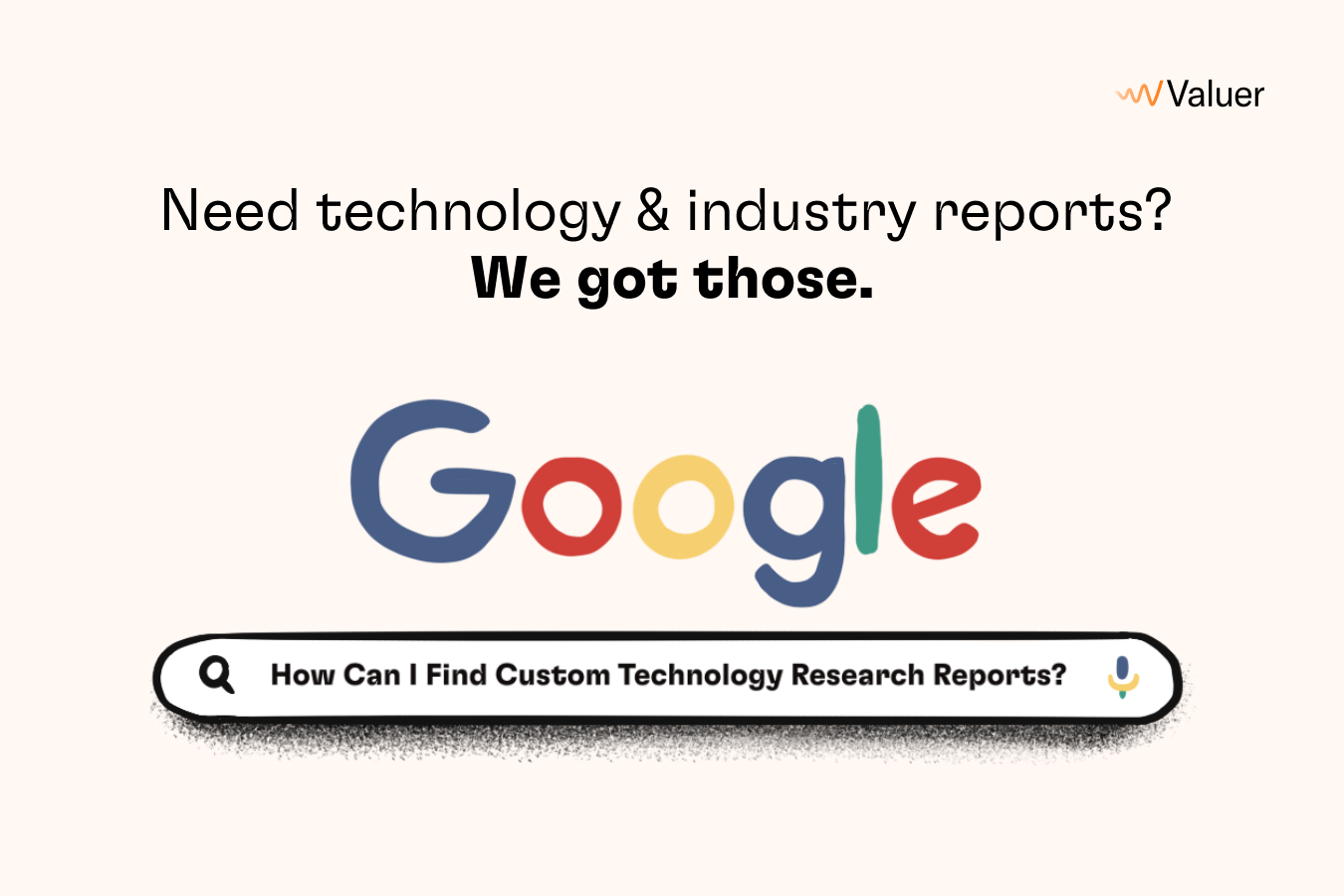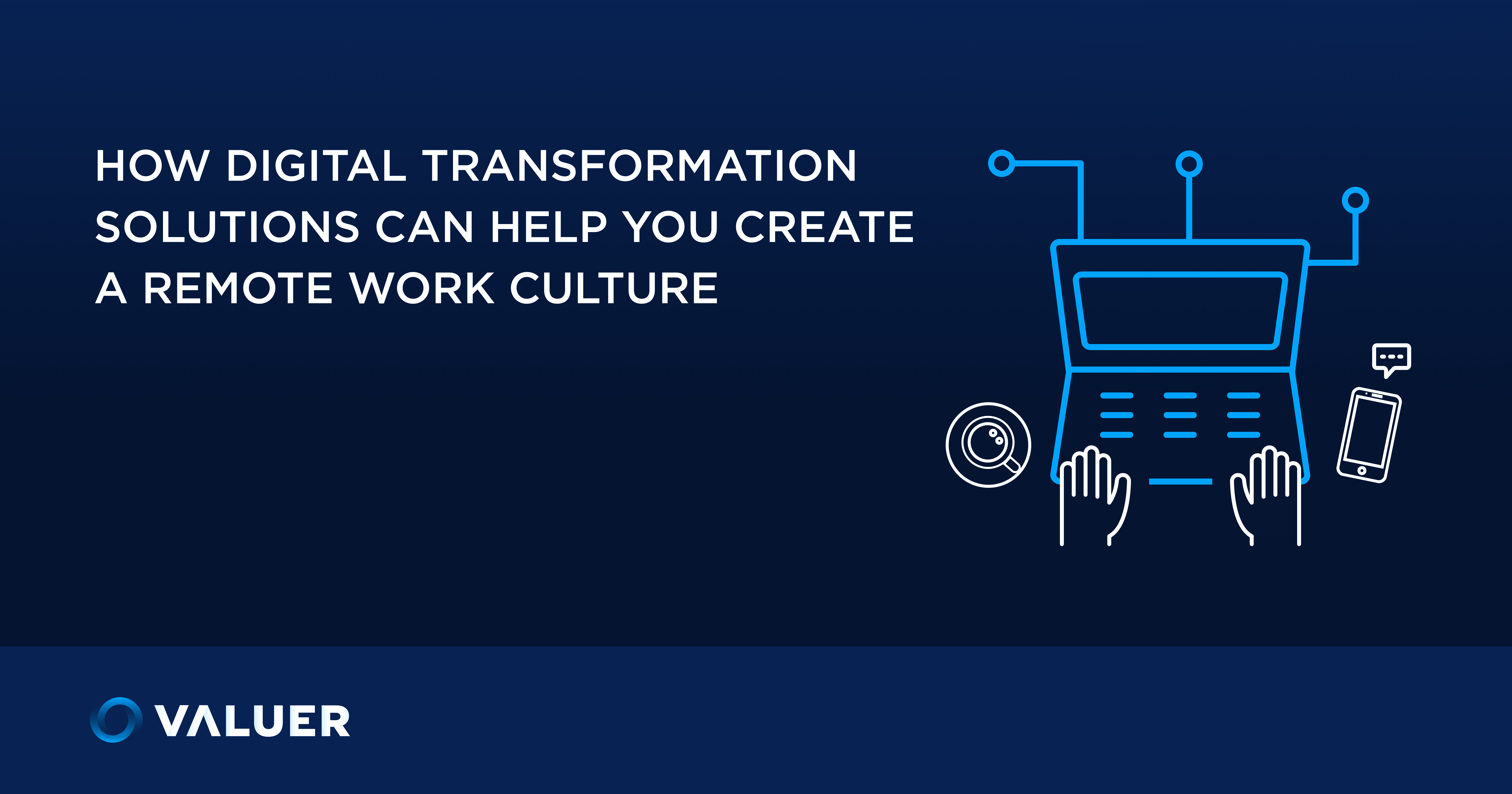Technology and industry research reports can provide valuable insights when companies wish to explore relevant digitalization trends in a specific industry. This article will touch upon the conventional ways to find information related to technology reports—a simple Google research, an in-house team, or outsourcing to an agency.
In contrast, it will also demonstrate novel approaches to researching technologies, such as entrusting the Valuer's analysts and AI with drafting a bespoke report on industry-specific technologies that will focus entirely on your company's needs and demands.
Use Google
To find information today, everyone's first choice is understandably Google. A simple Google search can yield numerous results regarding technology research reports, no matter the industry. Spanning less known sources to more distinguished ones, a Google search goes a long way to finding reports that suit your company's general needs, and more often than not, for free.
However, as with all things that come for free, there's a particular caveat. When accessing free research reports, one should remember that these are only scratching the surface of the industry of interest. For example, for most of the reports, chances are you'll only be able to access the summary and then hope it will provide enough information. Usually, these summaries contain a limited general overview of the industry, a value forecast for a particular period, half a dozen drivers or trends that contribute to the industry's future growth, as well as key players per region.

These reports are not benevolent forms of "information freely given." They are marketing. They offer you a glimpse into the industry's current and future state and maybe lure you into requesting their full report, which usually doesn't come cheap. The higher prices are also justified when you realize that some of these report providers are experienced enterprises with a year-long research tradition, operating with large teams of researchers in their corps. But is it something you should consider, keeping in mind that the same report is also available to anyone in public?
You'll receive the intelligence everyone else is getting without the option to customize it and adapt it to your specific industry data needs. It means that the report might not bring the value to the company you thought it would in the first place.
You can also consider searching for more in-depth reports on specific technology and digitalization trends. Examples include the Deloitte Tech Trends annual report that explores trending technologies each year, offering you a way to explore potential opportunities regarding innovation; there are also the WGSN analytics reports and forecasts focused on consumer goods industries. These reports are free to access and can provide initial guidance when exploring technologies. Yet, they are very general for a company's needs and, as mentioned earlier, are also available to the general public—more specifically, your competitors.
If you are looking for a more hands-on and customized approach, you could consider engaging with a research team. This would keep the specifics of your inquiries and insights regarding technologies more relevant and private to your company's context.
Hire a team
Hiring a team is a far more effective approach for acquiring technology and industry research reports than relying purely on search engine results. This team would be composed of in-house researchers whose aim is to provide you with data-based insights regarding the industry's tech trends. Companies that choose to develop their own research teams have to be aware that they are embarking on a time-intensive and costly journey. Nevertheless, it is still a more cost-effective option, especially when compared to hiring a market research agency.
The process usually starts with hiring experienced professionals in industry and market research. These professionals are not cheap to hire, as the more demanding ones come from market-leading research providers. Taking this in mind, the most obvious approach would be to hire researchers with little to no significant research experience and train them during their onboarding process.
There are several benefits to building an in-house research team. This team will have better insights into your company's goals regarding the data needs and its business vision and operations. In addition, the collaboration and coordination will be more straightforward, knowing that you have the team at your disposal at all times. As a result, you'll be able to effectively translate your data needs into requests and receive the research results promptly, making it much more time-effective than outsourcing the research, sometimes even in a matter of days.
As mentioned before, you might choose to hire a research team when the budget your company can allocate to research is limited. Understanding this, you have to be aware that the team might also be tight in size and capacity. Consequently, the quality of the research might also suffer, especially if this limited-sized team shuffles from one focus area to another to deliver you results quickly.
Hire an agency
Hiring an independent market and industry research agency is another way to solve your problems when obtaining high-quality data analysis or research reports for specific technologies or industries. However, it's not the simplest of choices, as most often, it means you'll be siphoning large sums of money into outsourced research. So, if you can foresee that your company will be able to keep up with the agency's fees over the coming period, there will definitely be benefits to reap.
The research agencies are experts in market research and have already built and invested in the human capital that always delivers. In addition to this, the agencies rely on all kinds of research resources and tools since they can purchase research software and access lucrative databases. The results they provide are comprehensive and integral, which will meet your company's data needs more effectively.
When outsourcing your research, you must remember that the process might take longer, and you should not hope for immediate results but prepare for a lingering process. Also, the fact that the research agencies have a large capacity and infrastructure means that you'll have to go through several phases. The process starts with defining the research objectives. The agency can assist you based on their specialization in a given industry and their understanding of what fits your company best.
However, when it comes to the following stages, it's essential to know that they operate in a specific framework meaning that you'll have limited customization options. Even though you'll receive quality analysis at the end, it will still be based only on the industry you've requested without putting your company in context.
Order a bespoke report from Valuer
Our approach represents a fresh perspective in the field of technology research. In addition to the already popular tools of our Platform, e.g., the Technology deep-dives and Company Enrichments, you as a client can request a customized report that will cater to your company's data needs better.
What is the process?
The process starts with you letting our sales team know about your needs and demands in terms of industries of interest. It is relevant to point out that the customization of the report entirely depends on you, whether it's the layout or technologies and companies included. With the assistance of our sales representatives, you can decide on the report's focus areas. Once these are identified and the research bases are concluded, the mantle is transferred to Valuer's technology research team.
The researchers' team consists of technology researchers and innovation researchers. The technology research team commences searching for best-suited technology trends and companies within an industry or sub-industries utilizing our platform's tools. The technologies and companies are extracted from our database, which offers more than 500,000 companies from numerous industries. In addition, the technology trends that are identified within the industries can lead you to Valuer's platform, where you can request additional information about them.
As our database is enriched regularly, it can yield a large number of companies depending on your industry of research. Suppose you have chosen a more lucrative industry, for example, those connected with blockchain technology or cybersecurity. In that case, the chances are that our database will provide several companies operating within these areas higher than the number of those we usually feature in a report. Should this be the case, you will be offered to undergo a voting process and determine the companies that fit your needs.
After your input, the selection of companies is finalized, and the researchers proceed with their enrichment process. Even though our research team enriches the companies' profiles according to a predefined format, given that the report is customized, you can also share your thoughts regarding the structure so that together, we can tweak it in the direction of what works best for your company. And even if the structure undergoes some changes, the research process remains the same to provide up-to-date qualitative analysis.
The technology researchers also set the guidelines for compiling the profile to provide you with all the relevant information. Next in our research funnel are our innovation researchers, who continue with an in-depth analysis of the company after the technology researchers have approved it. Once the draft version of the profile is composed, it is again picked up by the technology researchers. They check all the technical information regarding the companies and their product portfolios. Last but not least, the draft goes to our senior innovation researchers. They determine whether the non-technical data is valid and whether the vocabulary and grammar follow the Valuer standard.
Just before the company profile is finalized, we send the draft to the company in question to verify the validity of the information. The company can also request a meeting with the researcher who composed the draft analysis to discuss possible changes. Other companies opt to simply review the text and if they deem it necessary, provide us with additional information via email. Nevertheless, with this process, we make sure that their company profile is on point and up to date so we can deliver you legitimate data. Finally, when the company grants us approval, the profile is sent to our design team, and the production process is complete.
While the design is in progress, you can also access the selection of enriched company profiles on the Valuer platform through our radar feature and the designed bespoke report. As for the designed report, you can share it internally among your company's shareholders, and rest assured that you'd been delivered a technology report that matches your concrete data need.
How long does it take?
Depending on the scope and complexity of the report's focus areas, the production time can vary. However, the standard time for a bespoke report is around one month. Once the process is concluded, you will receive the report as a designed PDF file.
Our collaboration does not end when you receive that email informing you that the bespoke report has been completed. We make sure to remain available for you even after the delivery. Also, our sales representatives will schedule a feedback session with you after you've had the opportunity to review the report. Feedback can be of great value for you, in case there are points we've missed in the report and need amendments, but also for us, as it gives us insights into what works best for our customers and what can be improved for the future.













